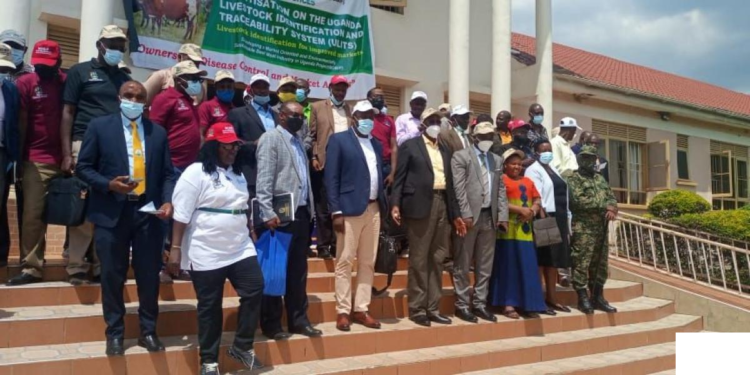The Ministry of Animal Industry has launched a project dubbed Market-Oriented And Environmentally Sustainable Beef Meat Industry (MOBIP) to Promote Animal Disease Control and Prevention in the cattle corridor of the western and central Uganda.
The project launched on Friday aims at having disease-free meat on the local and international Markets.
The 15. 6 million dollars project which will be Implemented in partnership with Makerere University, Livestock Development Forum(LDF) and the Ministry of Security (MoS) under the direct supervision of the Ministry of Agriculture, Animal Industry and Fisheries (MAAIF) and the Ministry of Finance, Planning and Economic Development (MoFPED) was launched by minister Bright Rwamirama at Isingiro district headquarters.
Prof Anthony Mugisha, the project coordinator said that the project areas have been divided into zones with the six districts in disease control zone one (DCZ1) namely Nakaseke, Nakasongola, Luwero, Kiryandongo, Masindi, and Gomba while eight districts constituting disease control zone two (DCZ2) are Lyantonde, Mbarara, Sembabule, Kiruhura, Kyankwanzi, Rakai, Kyotera, and Isingiro.
Mugisha said that the project will build disease control infrastructures in strategic areas with one holding ground in each of the districts of Rakai and Kyotera and two holding grounds in the Isingiro district noting the need for a buffer zone along the Tanzania border to enable livestock trade from these districts without posing a risk of spread of livestock diseases to other parts of the country.
The project will also construct 12 animal checkpoints along the cattle movement routes to enhance animal movement control as part of the animal disease control mechanism.
Mugisha said that the project will be managed using a proof of concept of the Livestock Identification and Traceability System (ULITS) which is a pilot project and also a book on the Control of Ticks and Tick-Borne Diseases in Uganda from Makerere University.
He explained that for the pilot project of Livestock Identification and Traceability System they are targeting 20,000 herds of cattle for a start, fourteen thousand selected farms in Isingiro, Rakai and Kyotera Districts, 3,000 under NAGRC project farms, and 3,000 under Uganda Meat Processors Cooperative Union farms.
Dr Rose Ann Andemun, the Commissioner of Animal Health Ministry of Animal Industry said the Livestock Identification and Traceability System that tracks down animal diseases from the farm will lift the cattle prices and even expand the number of cattle and products market.
She said the project will see the prices of animals increase from 1.2 Million to 5 million Shillings, especially in the European countries.
Minister Bright Rwamirama said the government has started formulating a law that will see the project fully implemented and all farmers involved in MOBIP and UTLIS projects.
He said the traceability system which has a technological chip inserted in the ear of the animal will enable the government to trace the source of any diseases from the farm since the farmers are tasked with keeping health records of their animals from birth to market and slaughter.
This he said, will increase the market for animal products from Uganda.
Felix Arinanitwe, Chairperson LC 1 Nshozi Cell and a farmer welcomed the project noting that instituting Checkpoints and Holding grounds at the border will ease the fight against foot and mouth disease that is spread by animals from Tanzania.
David Abaho a farmer from Endiizi Sub County said the diseases that have kept Isingiro district under quarantine are spread by cattle traders who bring animals from Tanzania and they are not monitored or checked.
He said that with the holding grounds and the traceability system they are hopeful the battle against animal diseases will be won.
Do you have a story in your community or an opinion to share with us: Email us at editorial@watchdoguganda.com












